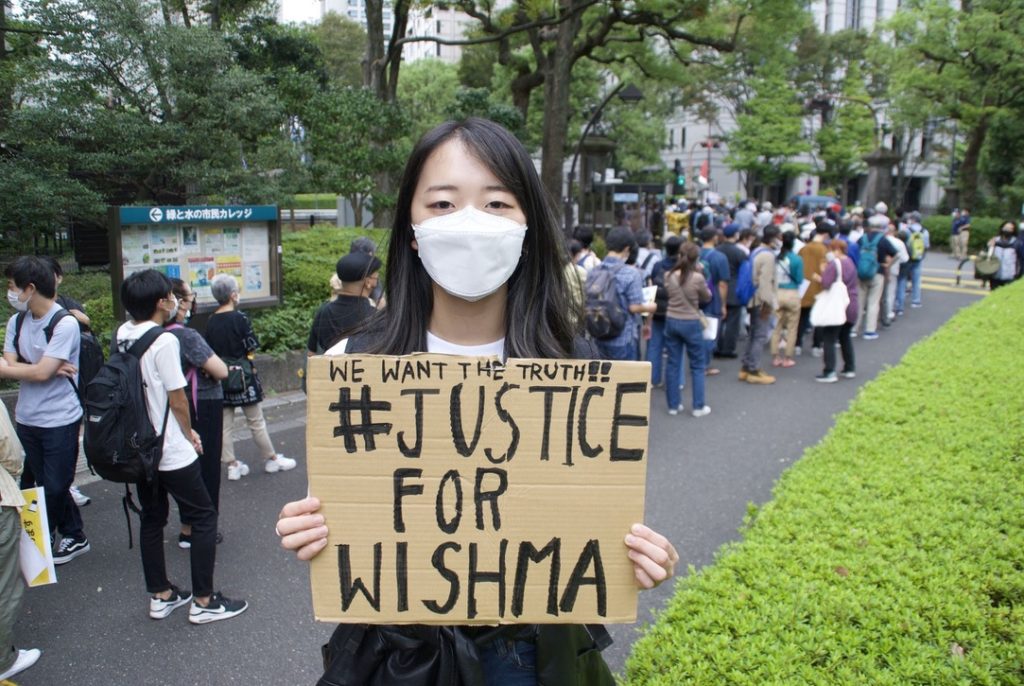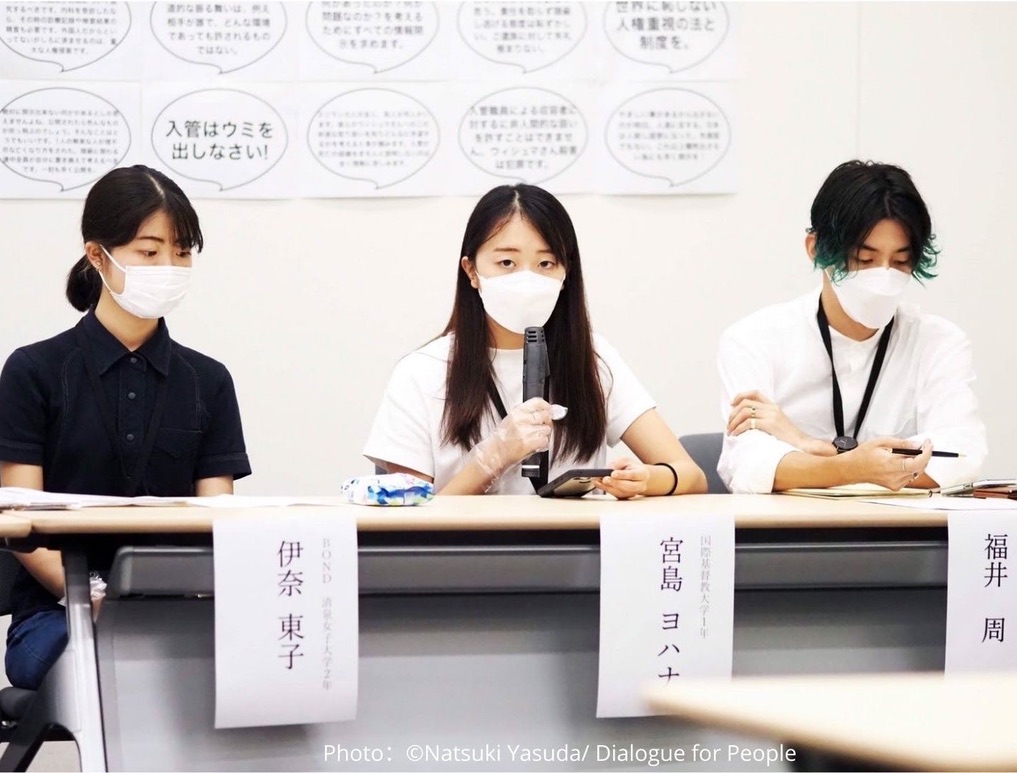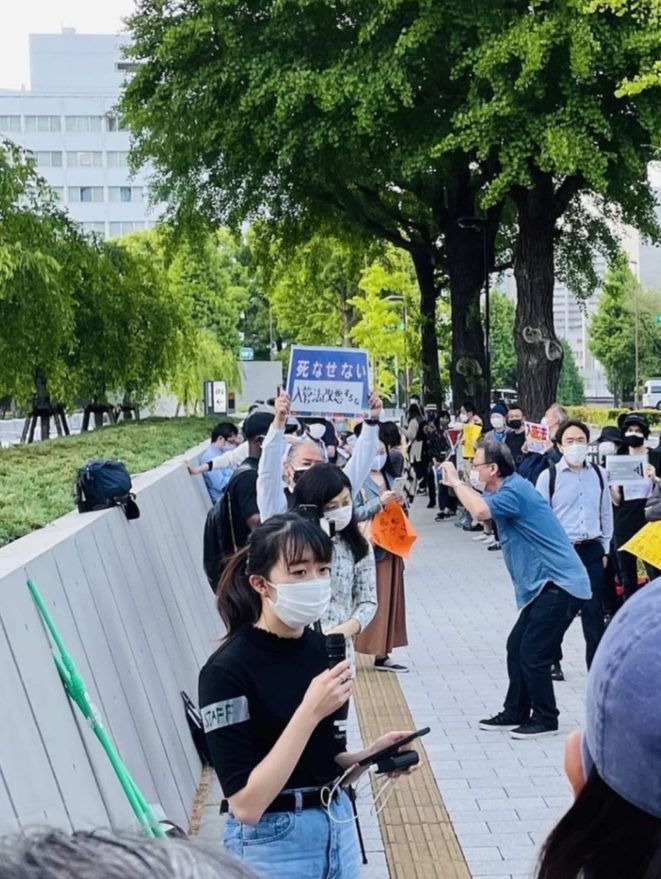Rising My Voice as a Student – An Interview with ID25 Yohana Miyajima who works on solving the Immigration issue | Part1
ICONfront interview article vol.22 features Yohana Miyajima who tackles immigration problems.

She belongs to the Student and Citizens’ Association which seeks the truth about the death of Wishma Sandamali, who was placed in Nagoya Regional Immigration Services Bureau, and she also belongs to the ICU student organization, IRIS. She is working on various actions for human rights issues that are occurring at the Immigration Detention Centers (generally referred to as immigration problems).
In the interview article Part1, she talked about her current activities, the problems which are occurring in Japan, and the causes behind them, so that people who are not familiar with immigration issues can gain a deeper understanding of the issue.
Please read this article to understand what it means for students to appeal to politics, and why it is needed now.
Q1. Could you tell us about your activities?
I have been working on immigration issues since this year. The Student and Citizens’ Association, which seeks the truth about the death of Wishma, is calling for the truth of Wishma’s death and thorough prevention of recurrence through press conferences and demonstrations.
In addition, I created a student group, IRIS, and I would like to make support activities for refugees and immigrants, and to request revisions which aligns with the international standards of the Immigration Control and Refugee Recognition Act through this circle.
Q2. Could you tell me more specifically about your activities?
The Japanese immigration system includes countless inhumane problems , such as extremely low refugee acceptance rate, indefinite detention, lack of adequate medical care, psychological abuse, and separation of children and parents. Also, a Sri Lankan woman named Wishma was left dying at Nagoya Regional Immigration Services Bureau in March, 2021. However, the truth of this case has not been investigated and the prevention of recurrence has not been made. In response to this incident, I have taken actions mainly online, such as by starting a hashtag campaign using #JusticeForWishma and planning hashtag demonstrations.
Other than that, there are various activities such as holding a press conference, hosting actions and demonstrations, and speaking at online events in cooperation with support groups such as BOND and SRSG. Recently, I have been working with another student (a high school student) to create a documentary about undocumented youths in Japan.

Q3. When did you start the activity?
In January of this year, I started to research the immigration issue for my high school senior thesis. I have already known about the immigration detention center because my father had been a guarantor for people who have provisional release status since 2009, but it was this year that I learned about the human rights violations in the immigration detention centers. As a part of the project, I interviewed a lawyer who has been involved in this issue and people who have been volunteering for many years. By doing so, I got to know the issue deeply, and it led to my current activities.
Q4. Please tell us what made you decide to create IRIS at ICU while you are already involved in various activities related to the Immigration issues.
As I was involved in this issue, I talked to the person who belonged to a refugee support circle called SRSG at Sophia University and visited the Immigration Bureau with them. Through such activities, I realized that it is possible to support refugees and immigrants through club activities at university. I was a high school student at that time, and I wanted to continue these activities even after I entered university. Therefore, I was introduced to Mr. Nicholas Kojima, who was already connected to SRSG, and we decided to create IRIS.
Q5. What are the possible ways for students to seek or appeal to change politics?
I wasn’t interested in politics before, but I became interested in politics once I started to get involved in this issue. At the end of April this year, when I was involved in the opposition movement to the immigration control law amendment, politicians and diet members gave speeches, and some political parties took up Wishma’s video disclosure as one of their list of policies in this year’s House of Councillors election. I realized firsthand that our voice reached the Diet through the experience of the abolishment of the Immigration Control Law Amendment.

I believe that there is a meaning in youths speaking up about politics. In Japan, it is rare for students to speak out about politics compared to Europe and the United States, hence that much more attention will be paid to students in Japan when they do. Certainly, I think many students have a difficult time understanding politics and what it means to them. However, I believe that as you investigate the issues that you are interested in, such as climate change or immigration issues, you will start to discover the relationship between yourself and politics. Making an action definitely requires courage, so I recommend starting by retweeting on Twitter, responding to an Instagram story about the issue, or joining a hashtag campaign. We can be involved in political and social issues through SNS as well, and we already have such opportunities and SNS platforms, so I think it would be great to take advantage of them.
Q6. It seems that many activities are done online. What are the strengths and weaknesses of speaking out online about politics?
I feel the strength is that many people can know about the problem simultaneously. We can create hashtags and search for them on SNS, and raise awareness of the problem to a wide audience. As I appear in various media such as newspapers, I sometimes receive messages from people with similar vision or passion on Instagram, Twitter, and direct messages. Through SNS, we can connect with organizations, students, and activists who are working individually, so I think “connecting with people” is one of the strengths of being active online.
Meanwhile, the weakness is that we cannot experience what we can feel face-to-face in demonstrations and actions. For example, when 100 people get together, it gives me the courage by realizing that so many people are interested in this issue and are demanding for Wishma’s video disclosure. Also, a lot of media-related people come to such places. I think that people who watch the media, which demonstrates the actual people who are doing the protests, will be inspired. In that sense, I suppose face-to-face is more appealing.
Q7. You mentioned at Q5 that the “Revised” Immigration Control and Refugee Recognition Law is in parentheses. What do you mean by this?
The amendment is a law of the Immigration Bureau, and long-term detention is the biggest problem. Immigration Bureau is a facility where foreigners who have lost Status of Residence are temporarily detained. For example, although there is no deadline for detention in the UK, they will be provisionally released in 7 days. Furthermore, the deadline for detention is 60 days in Spain, and six months in Germany and Italy, but there is no deadline in Japan. Therefore, the detention period can be up to three years; or in the worst case, seven years. Besides, Immigration Bureau is like a prison. Prisons have a deadline for detention, but in Immigration Bureau, just because people lose their Status of Residence, they don’t even have hope of knowing when they will be able to leave, when they will meet their families again, or when they will be able to return to their normal life. As a result, people often suffer depression, and in the worst case, commit suicide.
This “amendment” should have been issued to solve this problem of long-term detention, but looking at the contents, there are various problems. Some examples are the system of supervision measures system and the imposition of criminal penalties on foreigners who resist the order of deportation. In Japan, 90% of foreigners who have lost their Status of Residence return to their countries, but the rest of them do not return, but there is a reason why they cannot. Some examples include someone who has been denied refugee status or someone who has lived in Japan for decades and has a family in Japan. Therefore, I hope that more people understand that not all detainees are criminals. Another problem with the refugee situation in Japan is that Japan’s refugee acceptance rate is extremely low at 0.4%. In other words, there are many people in Japan who have applied for refugee status but cannot be accepted as a refugee. Some of the refugee applicants are at risk of persecution when they return to their countries, which is why they resist being deported. If the Immigration Control Law Amendment is passed, those who do not respond to deportation will be imposed criminal penalties in Japan. Therefore, it is as if the foreigners are being told to choose between returning to their countries and being persecuted or being killed, or remaining in Japan and being imposed criminal penalties.
Another problem is that it will be possible for those who have applied for refugee status more than three times to be subjected to deportation. This violates the Non-refoulement of international law. The Non-refoulement stipulates that refugees who may be persecuted in their country should not be deported to their country. Furthermore, as the UN’s Working Group on Arbitrary Detention has pointed out, this “amendment” proposal is not an “amendment” at all. Knowing this, I strongly felt that I had to oppose the Immigration Control Law Amendment, and I took action.
Q8. Is it because Japan pays too much attention on the Japanese people that has led to this situation?
Yes. After all, there is an aspect of putting the nation first, and I think that the problems of foreigners, including this problem, are difficult for Japanese people. Many people think, “I’m Japanese, so the problem of foreigners doesn’t matter,” so in that sense, I suppose it’s a problem that makes it difficult for Japanese citizens to put themselves in foreigners’ shoes. Through being involved in this issue, I often see people on the internet who hate foreigners and have xenophobia. However, since this problem is occurring in Japan, I believe it is important for Japanese people to think of this problem of their own and demand for the prevention of inhumane activities. I think that a society that allows human rights violations to foreigners will eventually lead to allowing human rights violations even to people of their own nation with low power and social status. Also, human rights violations should not be tolerated by people of any background; hencesociety that allows inhumane activities should never be tolerated.
Q9. Could you tell me more about the provisional release? Can those who are provisionally released be able to live freely?
They are temporarily released from the Immigration Bureau and can get out of the Immigration detention center, but they cannot work, and they have to report to the Immigration Bureau and get permission every time they go to the prefectural border or leave the prefecture. Also, health insurance doesn’t work. Therefore, there are provisionally released people who become homeless because they are not given a place to live, and it is a problem that they cannot live without the help of supporters and churches.
Q10. How has your image and understanding of the Immigration Bureau changed before and after tackling the Immigration issue?

Since my father used to be a guarantor for the provisional release, I had many opportunities to interact with the provisionally released people from a young age. Therefore, I knew about Immigration Bureau, but I didn’t quite understand what it was, because I understood it as a place where my father went every week. I had heard from my father that there were human rights violations in the detention centers, but since I believed that Japan was a peaceful country with no human rights violations, I was really surprised when I researched and learned about the problem. I was shocked to find out that human rights violations are occurring in Japan just like the systemic racism against black people that stirred the BLM movement in the United States. The media rarely covers this issue, so unless more people know about it, this situation will remain the same. This situation is shameful as a Japanese person, and I feel strongly that it must change.
We hope you enjoyed part1. In part2, She will talk about how she will talk about how she felt when she start her activities, what she realized through the activities, and how to get involved in the Immigration issue. Please look forward to the next article – part2!
[Yohana Miyajima’s SNS account]
Instagram : @yohanamiyajima
Twitter : @Yohana16137198
Facebook : @Yohana Miyajima